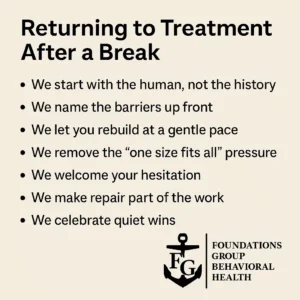You didn’t fail. You hit a wall.
You left mid-treatment. Maybe without saying goodbye. Maybe with guilt already creeping in the moment you stopped replying.
The shame spiral probably set in fast:
“They’ll think I didn’t care.”
“I’ll have to start from scratch.”
“I already blew it. Why bother now?”
But here’s the thing—ghosting treatment doesn’t mean you weren’t serious. It means something got hard. Maybe too hard for the support you had at the time.
At Foundations Group Behavioral Health, we don’t ask why you left as a test. We ask it so we can help you stay the next time. From Falmouth to Barnstable County and across Cape Cod, we work with real people navigating real-life challenges that don’t disappear just because they started therapy.
Here’s how we make outpatient mental health work when you’re coming back after a tough exit—and why it doesn’t have to look the same.
1. We Start With the Human, Not the History
Some people walk in apologizing. Others ghosted a year ago and finally called back because something cracked.
We don’t do guilt trips.
Whether it’s been three days or three years since your last session, the door is open. No lectures. No cross-examinations.
Instead, we say:
“Tell us what made it feel too heavy last time.”
“What’s changed in your life since then?”
“What could help it feel doable now?”
Your story is your starting point—not your record.
2. We Name the Barriers Up Front
When people ghost, it’s often because treatment hit a nerve and a logistical wall:
- The group dynamic didn’t feel safe
- Sessions conflicted with your work or childcare
- The emotional ask was too high, too fast
- You were navigating burnout, trauma, addiction—or all three—and no one paused to check the pace
We’ll walk with you through what didn’t work, without assuming what should. Then we build a plan with you, not around you.
3. We Let You Rebuild at a Gentle Pace
The first time around, maybe you dove in headfirst. IOP, multiple groups, a new therapist—then boom: life happened. Or anxiety surged. Or something inside whispered, “This is too much.”
This time, we make space to go slower:
- Start with one-on-one therapy only
- Keep groups optional until you feel ready
- Focus on simple stabilization before diving into deeper trauma or pattern work
Outpatient care can stretch or shrink depending on where you are. And where you are is enough.
4. We Remove the “One Size Fits All” Pressure
Rigid schedules. Standardized tracks. Long commutes. These might work on paper—but they fall apart when life isn’t neat.
If you left because your treatment plan didn’t flex, we’ve got news: we’ve changed.
At Foundations, your plan adapts with you:
- Virtual therapy options for parents, professionals, or clients with mobility needs
- Evening hours for working clients
- Hybrid support that blends weekly sessions with text-based check-ins (where available)
Whether you’re looking for outpatient mental health in Barnstable County or juggling life in Falmouth, our programs bend to fit—because mental health care shouldn’t require you to break your life to fix your mind.
5. We Welcome Your Hesitation
Coming back can feel vulnerable—even awkward. Maybe you’re still not sure it’ll help. Maybe part of you is scared you’ll leave again.
That’s okay. You don’t have to walk back in confident. You just have to walk back in.
One client said:
“I almost didn’t call because I felt embarrassed. But my provider said, ‘You get to need support even if you’ve needed it before.’ That cracked something open for me.”
You can return nervous. You can return unsure. You can return angry, tender, quiet, skeptical—or all of it at once.
There’s room for all of that.
6. We Make Repair Part of the Work
Leaving treatment mid-way can feel like burning a bridge. But it’s not. At least not here.
If something in the past hurt or didn’t land right—maybe a provider mismatch or a group experience that shut you down—we want to name it. Repair it. And not pretend it didn’t happen.
That might mean:
- Switching clinicians
- Shifting your therapy style (from CBT to DBT, or trauma-focused care)
- Redefining success (maybe “progress” looks different this time)
Ghosting doesn’t disqualify you. It deepens the conversation.
7. We Celebrate Quiet Wins
You don’t need to come back and suddenly be “ready to do the work.” Maybe this time, progress looks like:
- Logging into your first session after six months away
- Sitting in a group and just listening
- Texting your therapist instead of ghosting again
One client said:
“Coming back felt like standing on shaky legs. But every time I showed up—even just for 30 minutes—I remembered I still had a choice.”
That’s the heartbeat of outpatient mental health when you return: it’s not about proving you can do it. It’s about remembering you’re allowed to try again.
FAQs for People Returning to Treatment
Do I have to explain why I left?
Nope. You’re welcome to share if it helps, but we’ll never demand an explanation. Your return is what matters—not your exit.
Will I have to restart everything from scratch?
Not at all. We’ll pick up where it makes the most sense based on how much time has passed and what you’re ready for now.
Can I change therapists or programs if the last one didn’t fit?
Absolutely. Whether it’s switching providers or shifting from IOP to standard outpatient care, we want the plan to feel aligned.
What if I leave again?
Then you leave again. But you’ll leave knowing the door is still open. We’ll support you as long as you want it. And we’ll welcome you back if and when you return.
What if my life circumstances have changed a lot since I first started?
We expect that. Whether you’ve moved, started a new job, or are parenting now, we’ll adjust your treatment plan accordingly.
Is outpatient care available virtually in Cape Cod?
Yes. Many of our Outpatient Mental Health services are offered virtually for clients in Cape Cod, Barnstable County, and Falmouth. We make access easier than it’s ever been.
You didn’t fall off the path. You just took a break.
Call 888-685-9730 or visit our Outpatient Mental Health page to restart care that meets you where you are. You’re not behind. You’re just beginning again—with support that actually fits.









